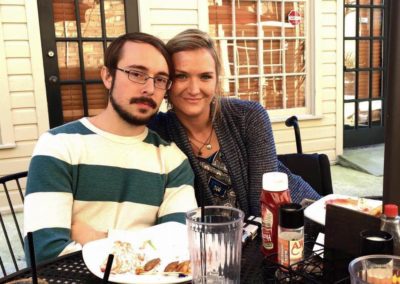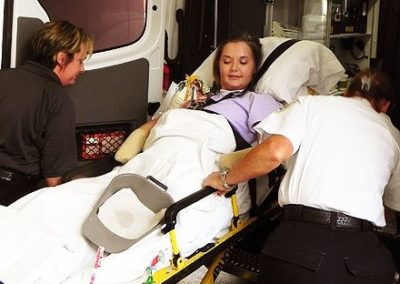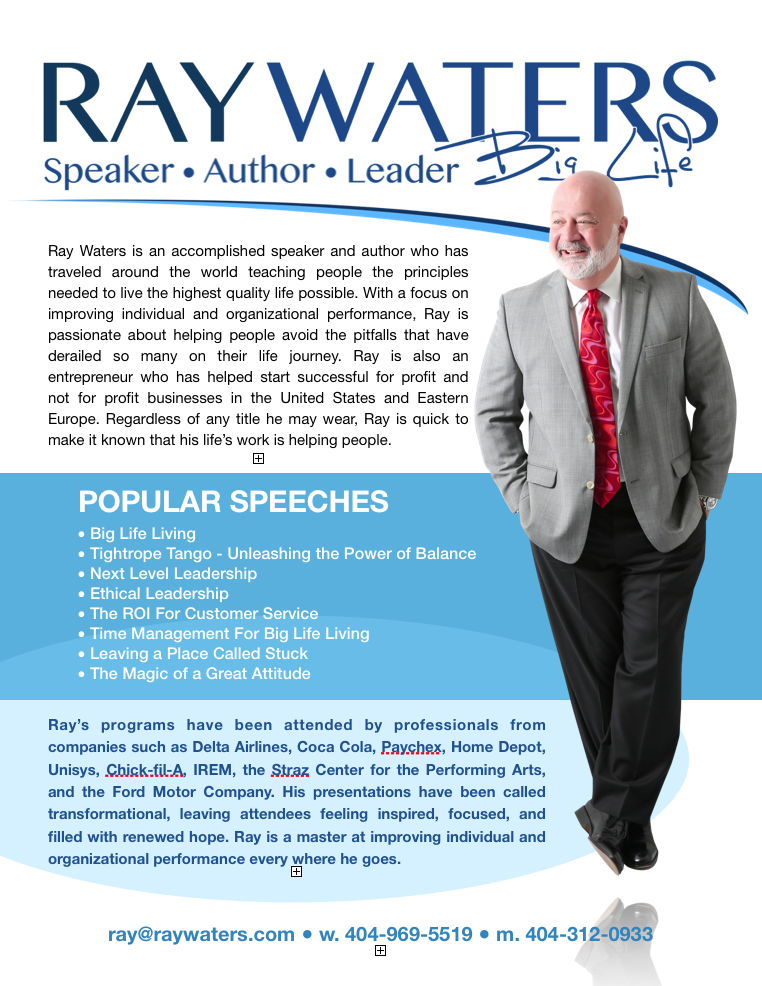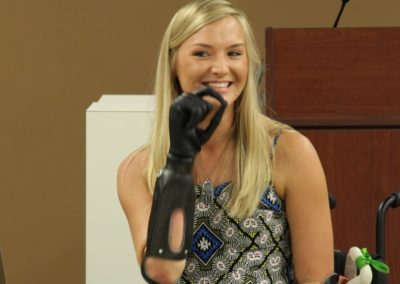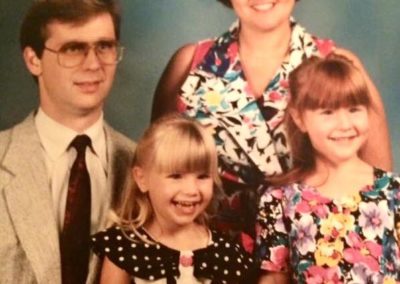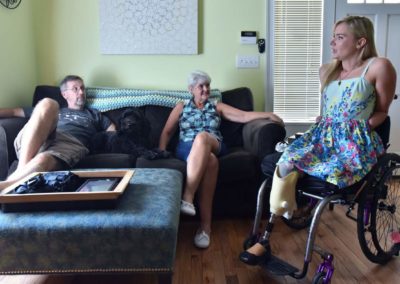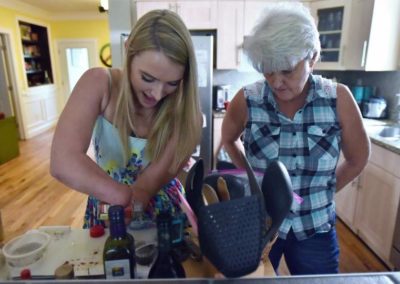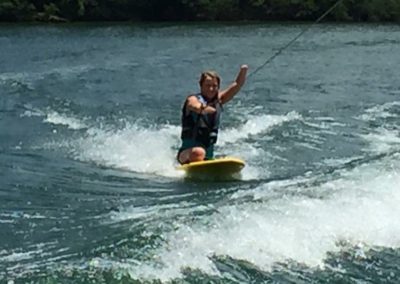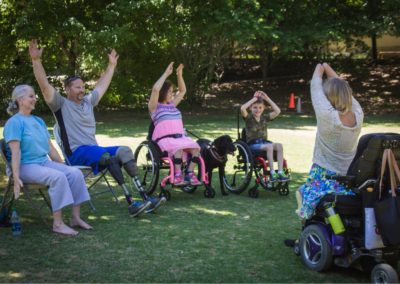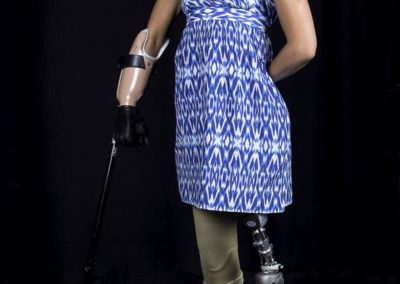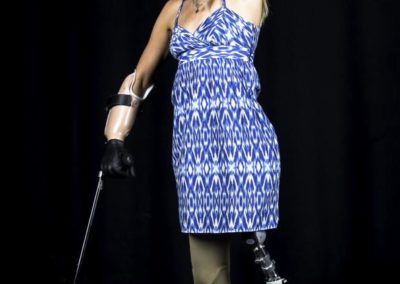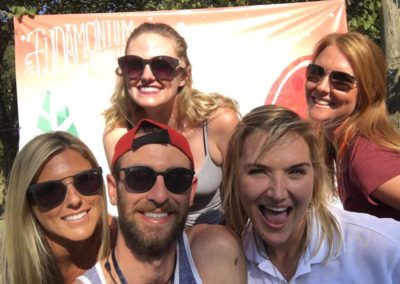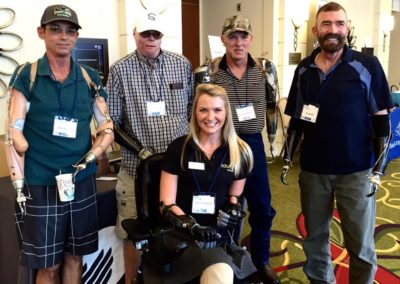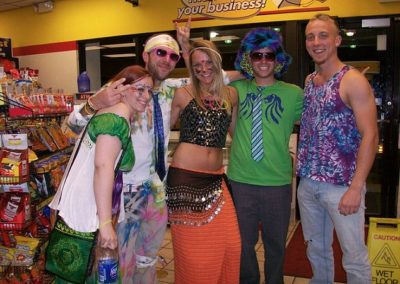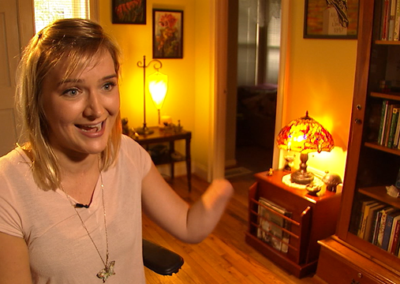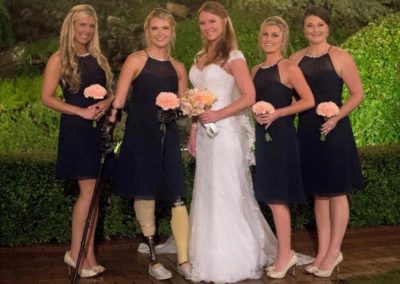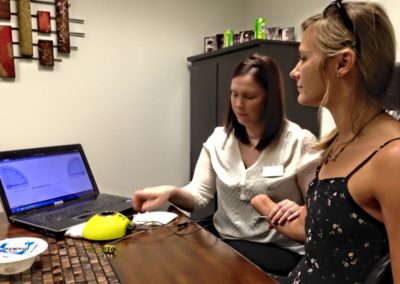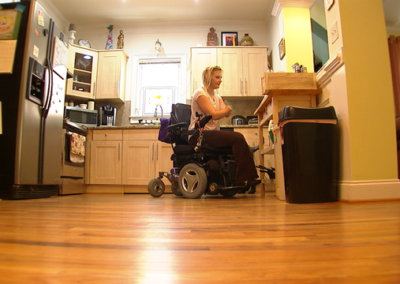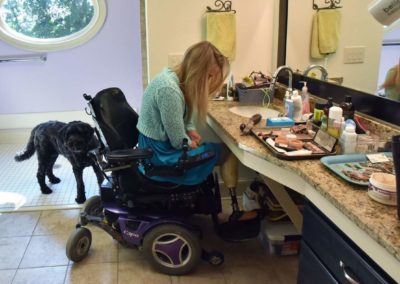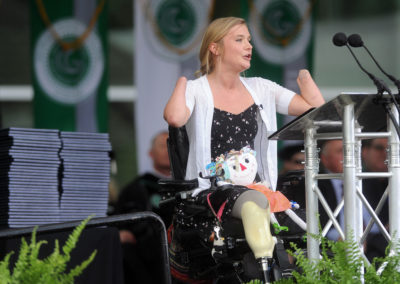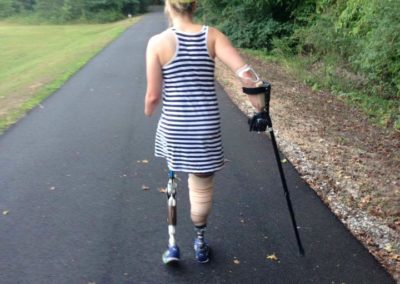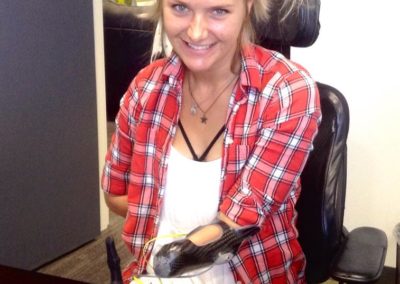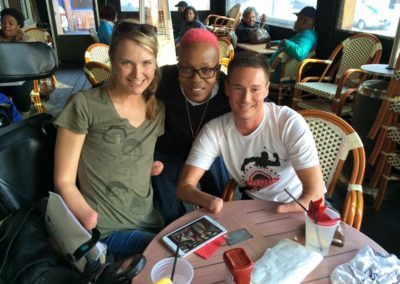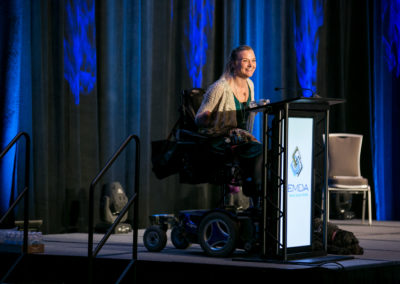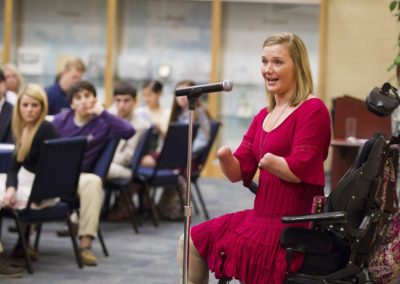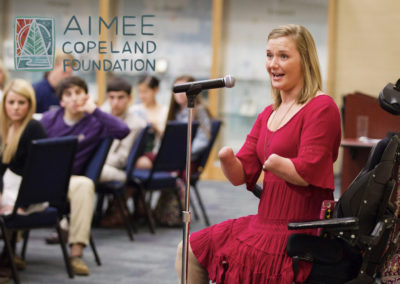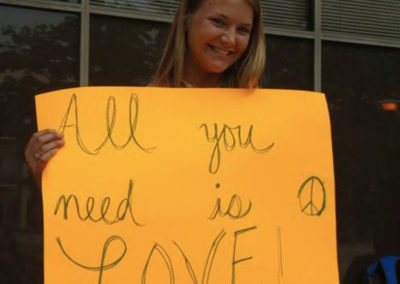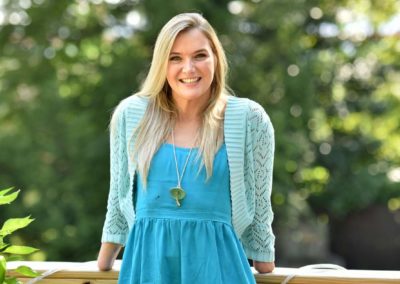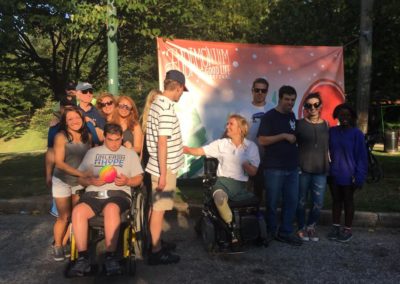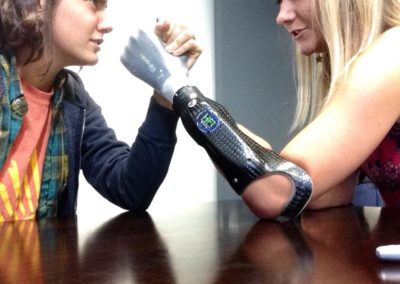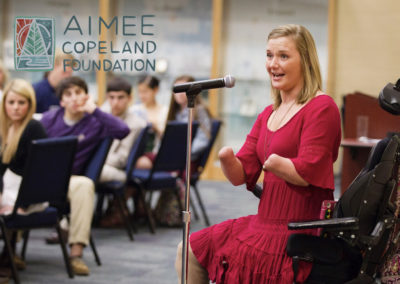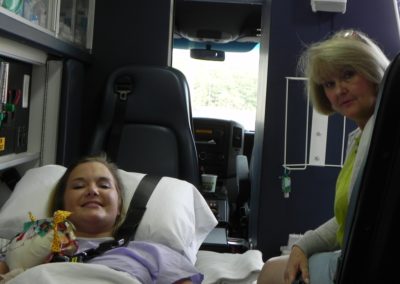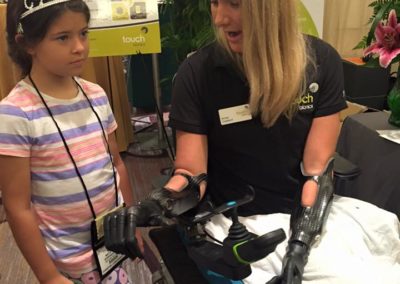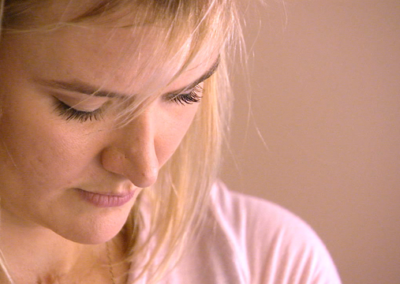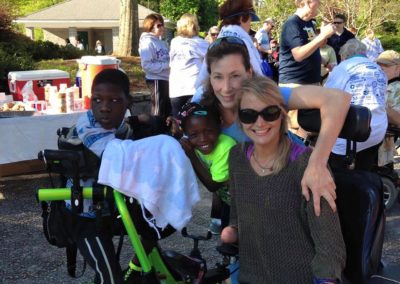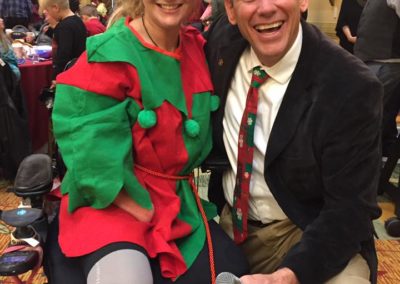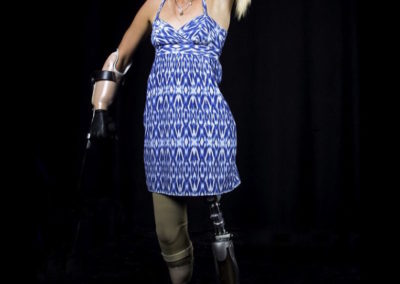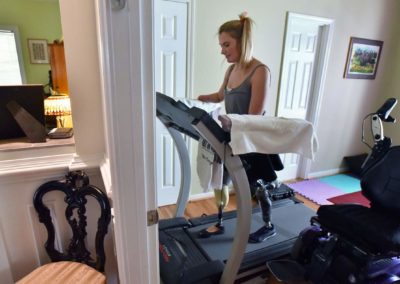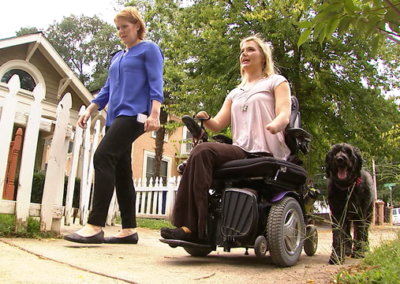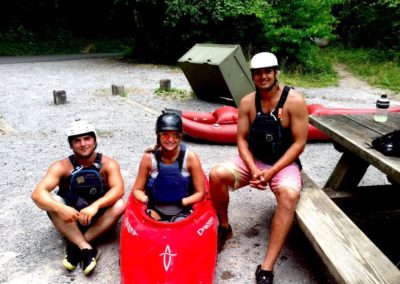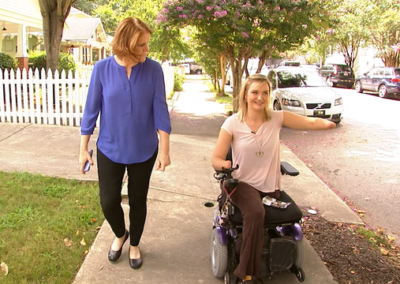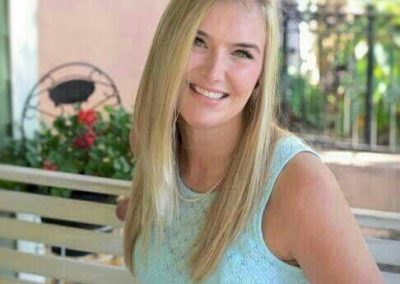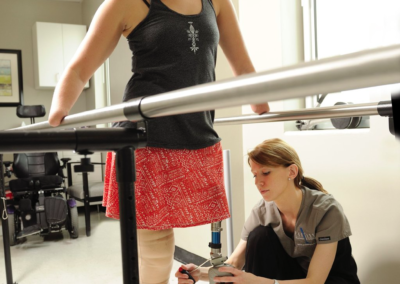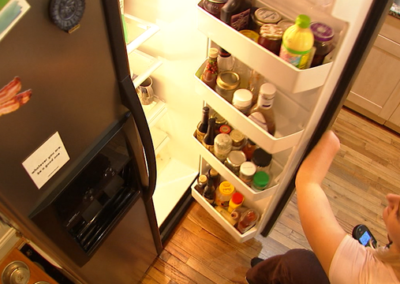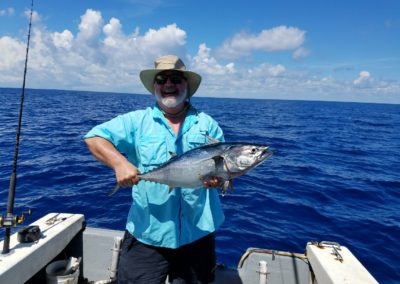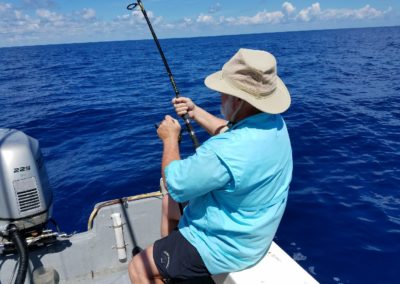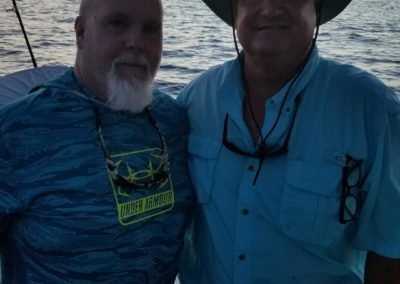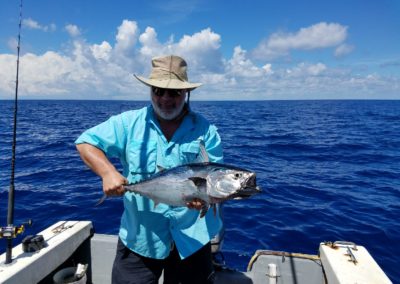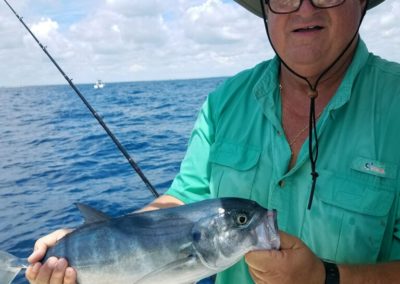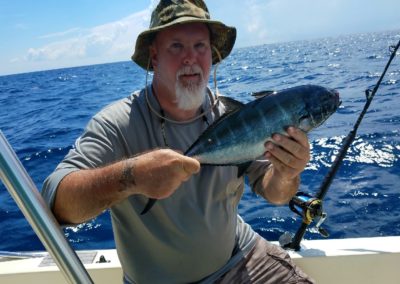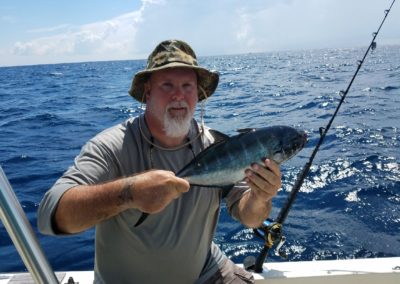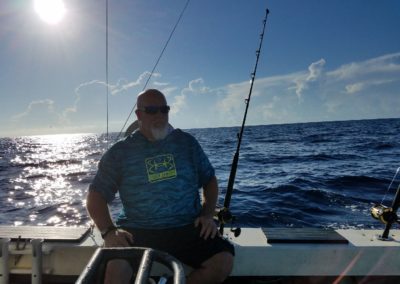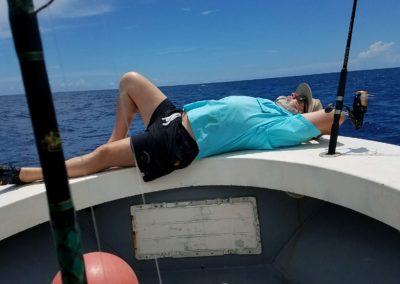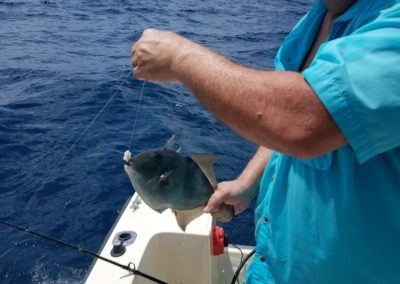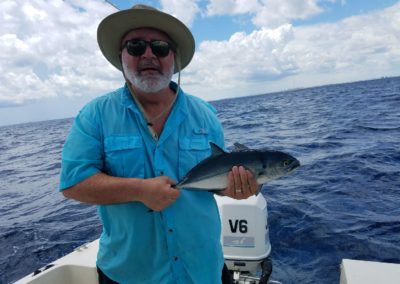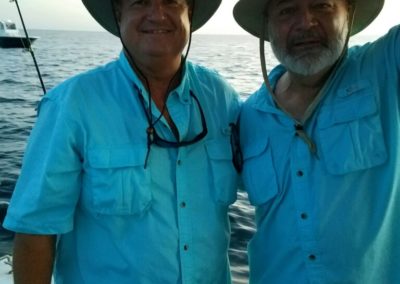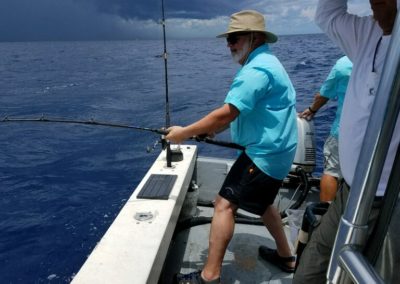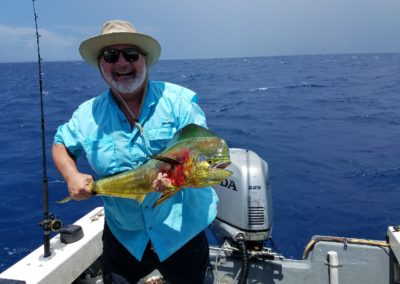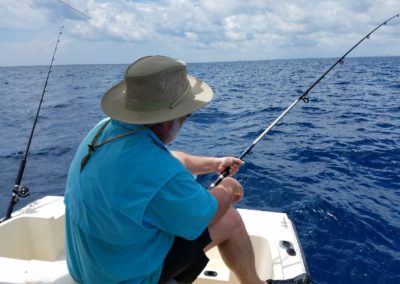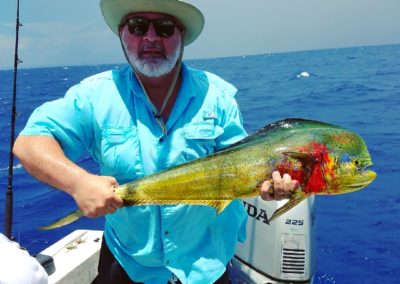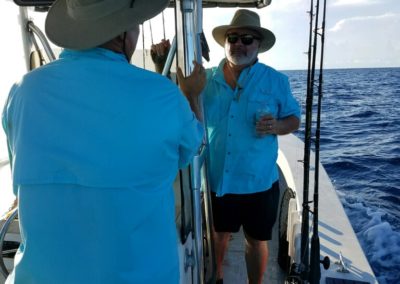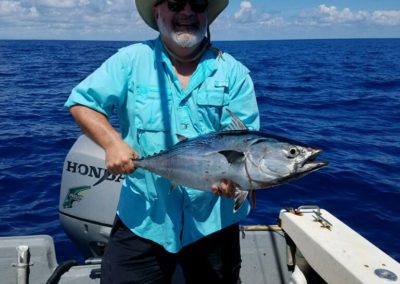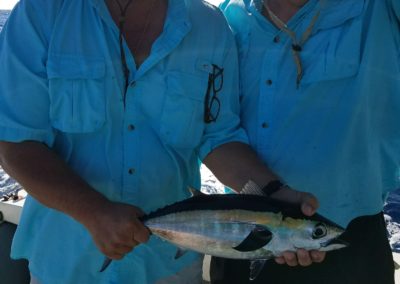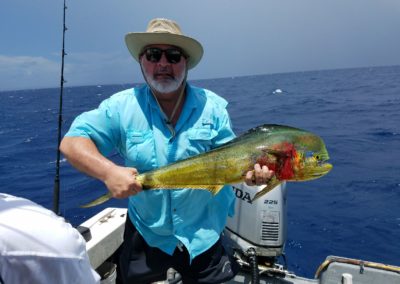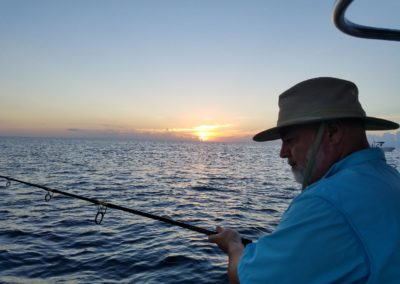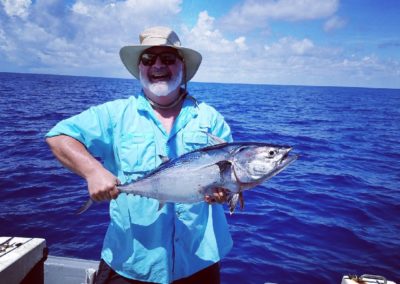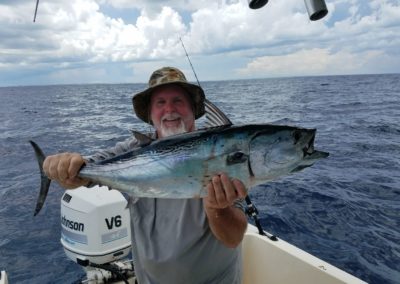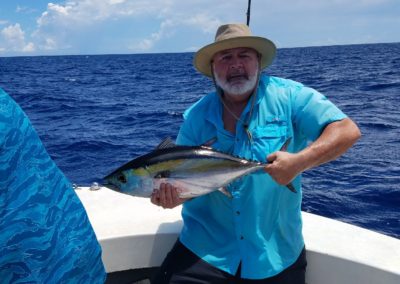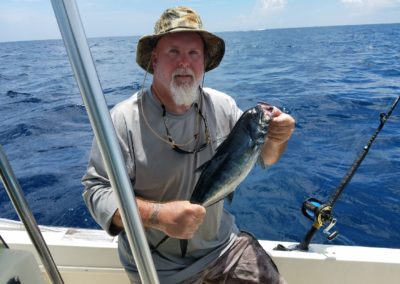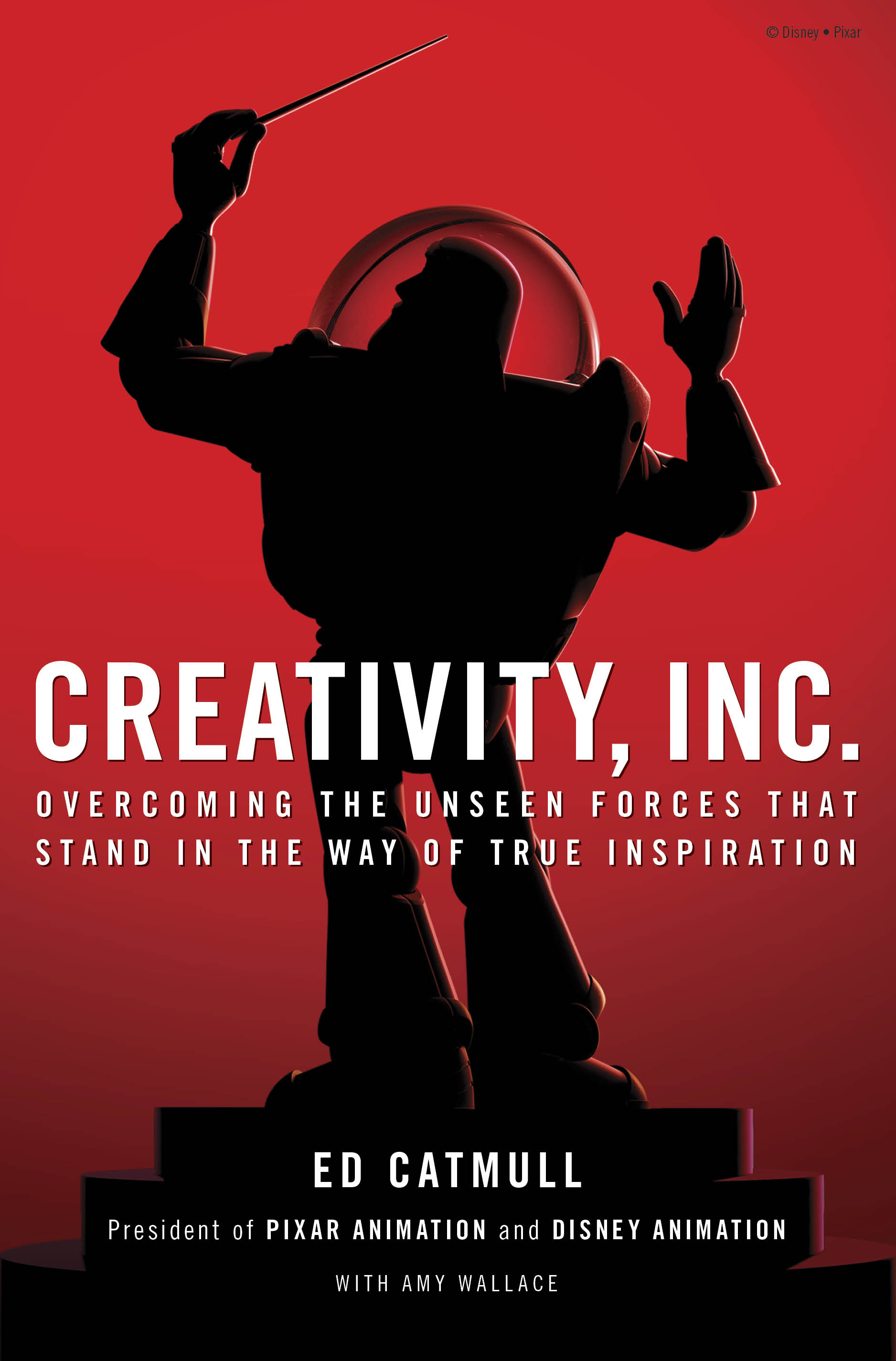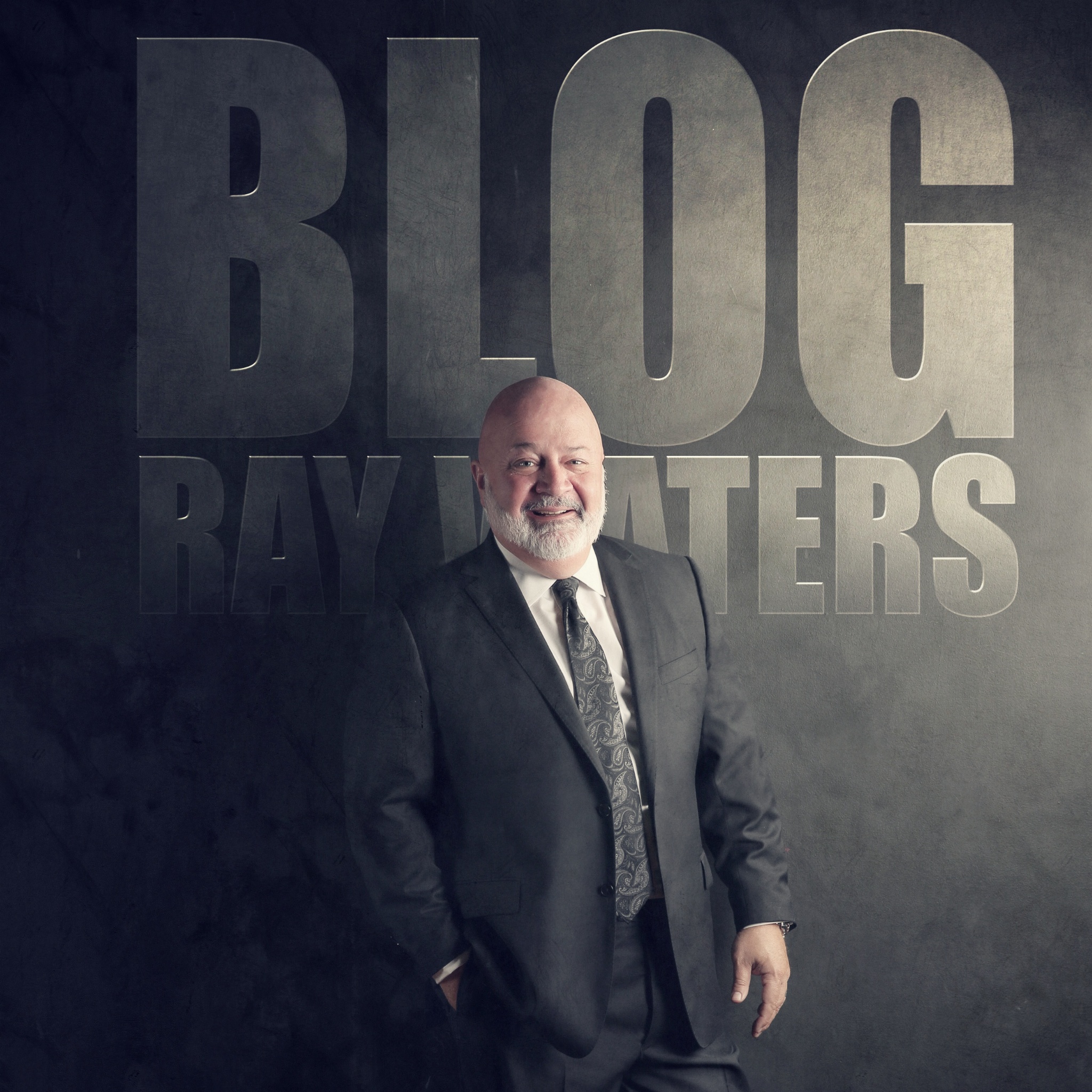
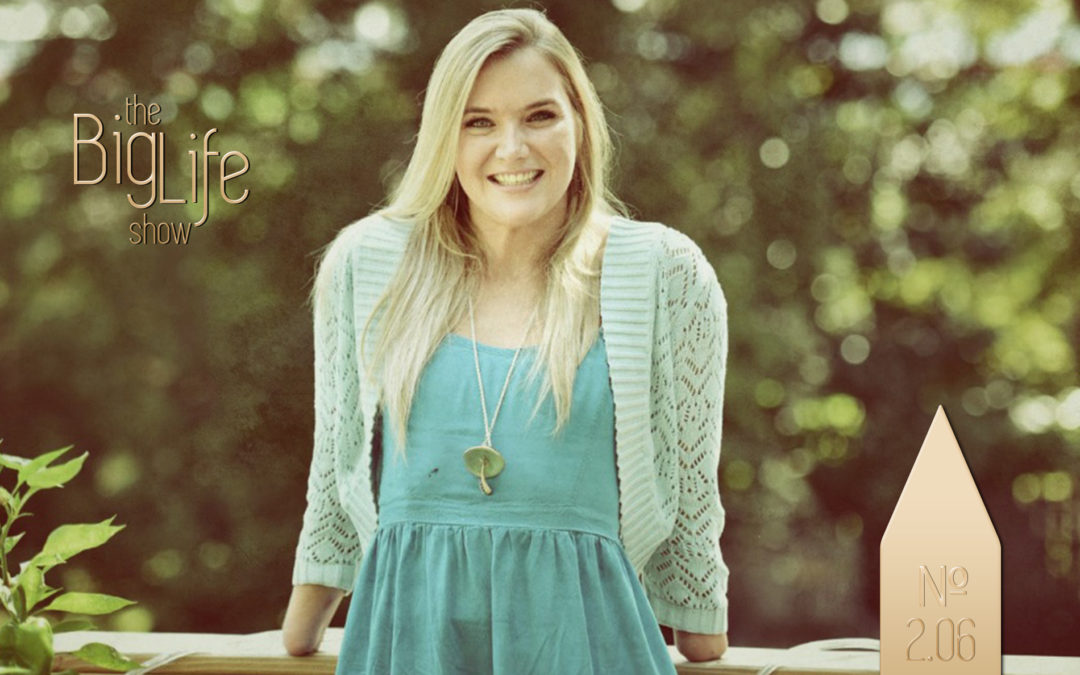
BLS № 2.06 Aimee Copeland
Big Life № 2.06 | Aimee Copeland
Before her accident in 2012, Aimee Copeland lived to be outdoors. She climbed rocks, and backpacked deep into the woods to camp whenever she wasn’t working two jobs or studying psychology at the University of West Georgia.
On a beautiful day on the first of May, Aimee and some friends found a homemade zip-line suspended over the Little Tallapoosa River. The zip-line broke during Aimee’s second ride. She fell on rocks below cutting a large gash in her outer-left calf.
Three days later she was diagnosed with necrotizing fasciitis commonly referred to as flesh-eating bacteria. She lost parts of all four limbs due to the infection. Doctors told her she had little chance of survival, but not only is Aimee a surviver, she is a thriver.
Aimee’s love of outdoor adventure didn’t go away, but life as an amputee using a wheelchair meant she had to find new ways to do things she loves. She swims, kayaks, bikes, and even water skis. She has two Master’s Degrees, and now works as a licensed master of social work, and a practicing mental health counselor.
Her foundation, The Aimee Copeland Foundation is working to make every place, especially public outdoor spaces like National Parks, accessible to everyone.
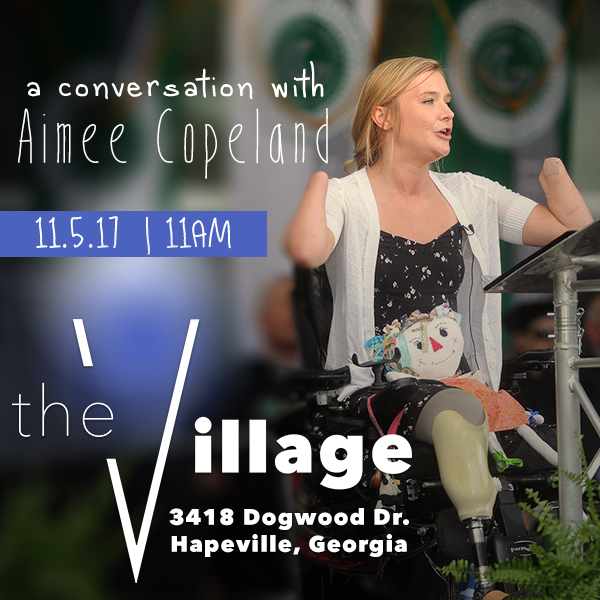
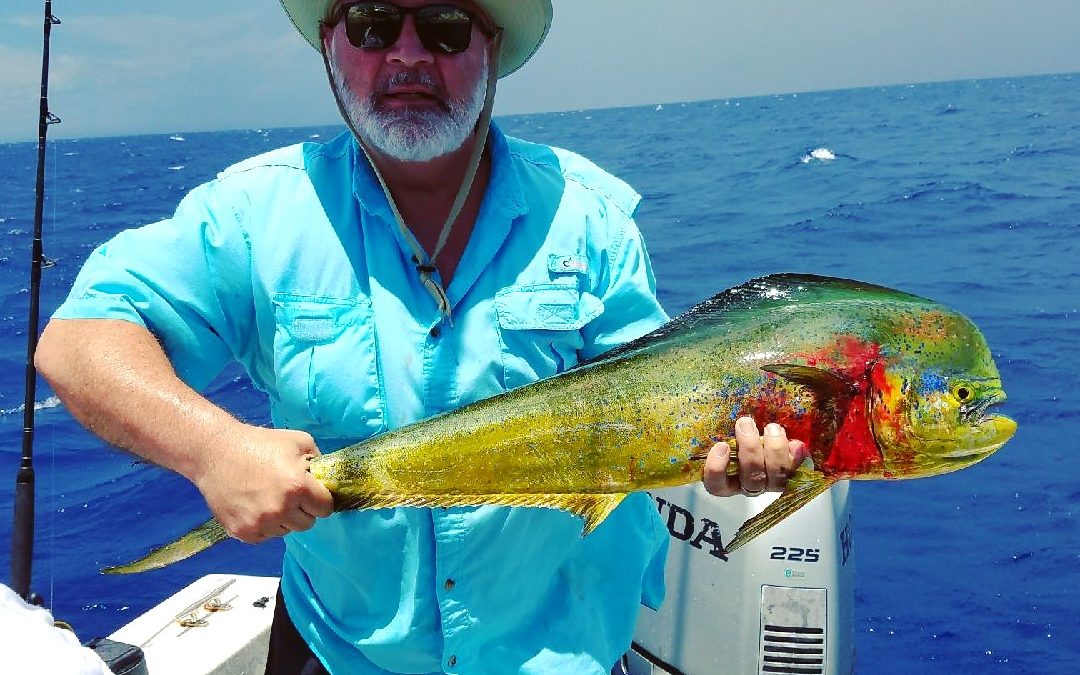
A Good Fish Story
I love real adventure. I have traveled the world, been chased by baboons in Africa, hang glided across the Swiss Alps, and jumped out of a perfectly good airplane at 15,000 feet. But, I never thought fishing could be called an adventure. It seemed monotonous to me. I just never saw the point. No, nasty letters, please. Every time I went fishing I sat in a boat for hours and never caught anything. That was true, until this weekend.
I have a good friend I grew up with named Tim. Tim and his wife live in West Palm Beach where he is a successful business man. Jane and I ate dinner with them a month ago, and Tim invited me down to fish. I reached out to a mutual friend of ours from grade school named Chuck, and we made the arrangements and arrived in West Palm this past Friday.
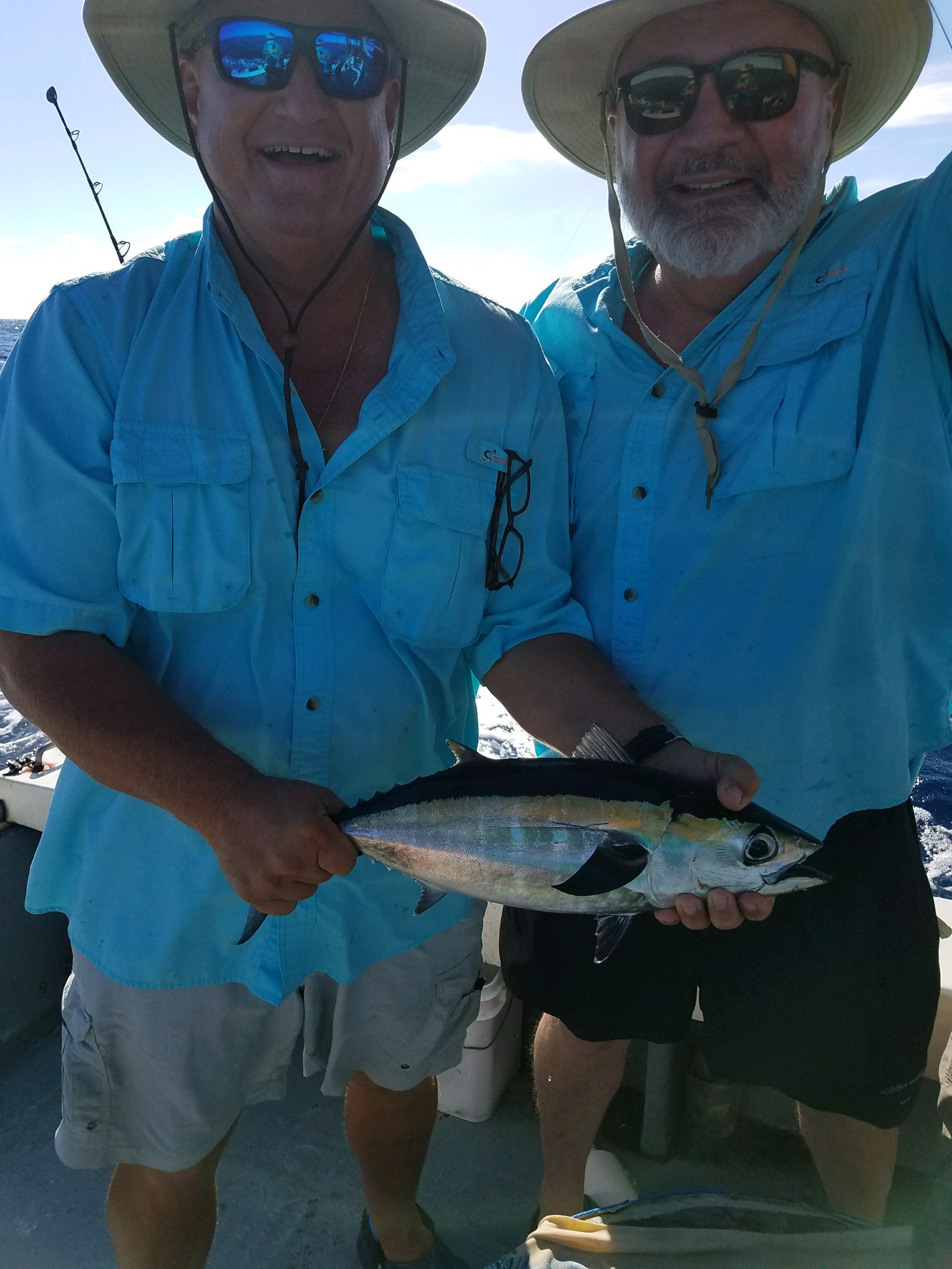
Our first day of fishing was Saturday. Tim picked us up at the hotel at 5:00 AM. We met the captain of our fishing boat at the dock and were in the inter coastal waterway headed for the sea by 5:45 AM. Shortly after we left shore, we caught about 50 sardines which would be our live bait for the day. When I caught my first sardine, I let everybody know that was officially the biggest fish I had ever caught.
The morning started slowly. We tried a few spots around 15 miles from shore but were having no luck. Then all of a sudden the fish began to hit. We caught Black Finned Tuna one after the other. It was exhilarating. The tuna would fight and struggle enough to make it pretty hard to reel them in. They were all around 10 pounds in size. Just about the time you’d put a hook in the water and decide you were going to take a momentary rest, one of the guys would yell, “FIsh on,” which alerted us that we had a fish on the pole.
Then the captain began to cut up chum. Chum is fish that is cut up and thrown into the water. I thought that was interesting, but I had no idea what was about to happen. Suddenly, I felt a fish on my line, but this time it felt different. It didn’t dive as the tuna did. The fish on the line was trying to swim away from me then it would jump out of the water showing me it’s beautiful colors. Our captain shouted, “That’s Mahi Mahi.” I had eaten one before, but I had never seen one in its natural habitat.
As I got my Mahi in the boat, Chuck and Tim had Mahi on their hooks. As we reeled in the fish, the captain would come gaff the fish and pull them into the boat. In just a few minutes we had quite a few Mahi Mahi on the floor of our vessel. The water was green and blue as a school of these fish were all around the boat. The chum had created a feeding frenzy. I have never seen anything like that in my life. The energy on the craft was palpable. The captain was cutting and throwing the chum into the water, and we were catching these beautiful fish one after the other. It was thrilling.
We caught fish all day long. If they were great fish to eat, we put them in a cooler to take home. If they were not good for food, we took the hook out and threw them back.
We fished again on Sunday. This time in Tim’s boat, we stayed within 3-4 miles of the shore. Tim had a plan for us, and it worked like a charm. We fished for three hours and caught 35 beautiful fish including more tuna, amberjack, mangrove snapper, and a few sharks. We also caught a gorgeous 80-100 pound fish that sailed out of the water to show himself to us before he snapped our line and swam away. It was breathtaking.
I am home now and have been reflecting on my fishing adventure with my friends. It has been on my mind all day. I have already scheduled a trip in September to take my wife fishing. I want my sons to go fishing with me. I even have been envisioning taking men and woman on Big Life fishing trips. I think they would love it. We would fish during the day and eat seafood and talk business each evening.
I love adventure. I do not have the temperament to sit all day hoping for a nibble. But deep sea fishing, that’s a different story. I have discovered after this trip that I am seriously hooked. 🙂
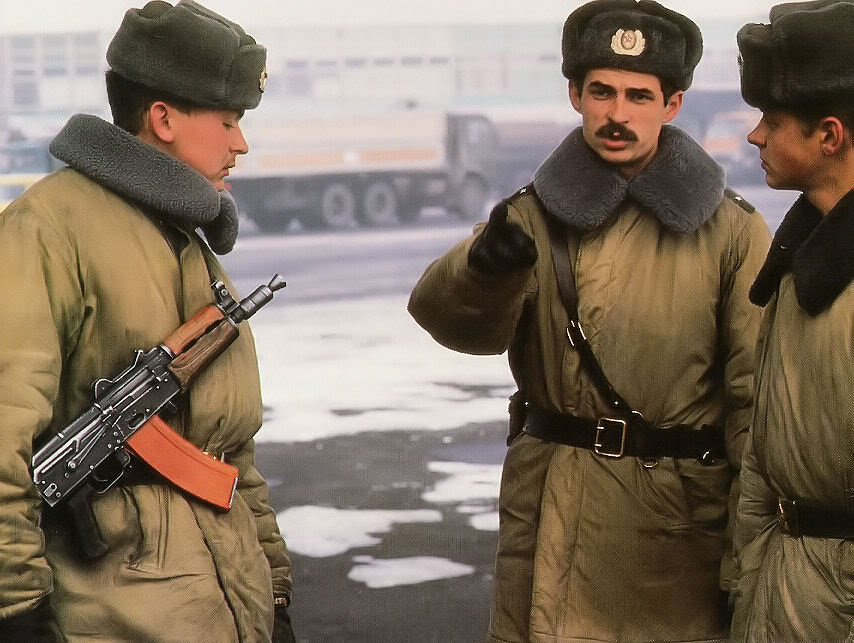
That Time I Almost Wound Up In A Russian Gulag
In 1996, I made my first trip to Russia. With quite a bit of nervousness, I bordered a plane and flew to Helsinki, Finland then traveled by boat to Tallin, Estonia. There I hooked up with a couple of other guys from America who were going to be spending the next three weeks with me. One of the men was a journalist for a Christian newspaper, and the other guy was a humanitarian aid worker. We would be traveling in a late 1960’s military jeep and would be giving the vehicle to a church group upon our arrival in Russia.
The bumpy ride across the small Baltic country was exhilarating. Because I was the youngest, I volunteered to sit in the back of the jeep with the luggage. When we came to the Russian border, I was genuinely excited. The soldiers asked us to allow them to look through our bags. Fortunately, the humanitarian aid worker with us understood Russian, and he told them that would be ok.
As I was standing behind the jeep, the journalist came up to me and said he needed to tell me something. He said, “Ray, I think we might be in some trouble.”
OK, put your self in my shoes for just a moment. There are men all around me with submachine guns. There is a tower just off of the road where more soldiers are watching the border. And this guy I don’t know well is telling me ‘we might be in some trouble”.
He continued. “I have a loaded gun in that trunk.” He was speaking of the next piece of luggage about to be inspected.
I immediately felt myself growing a little faint. I remembered reading about Aleksandr Solzhenitsyn, the Russian dissident who had written The Gulag Archipelago. Was I about to be arrested because of my traveling companions foolishness? I couldn’t run – so I did the only thing left to do. I prayed. I do not know if I have ever offered a more direct prayer in my life. “God, I am sorry this man I am traveling with is an idiot. Please, please, please don’t let the soldiers find his gun. And Lord, if they do find his gun, please let them know that it is his gun and that I would not/did not bring a loaded gun into Russia.” Well, you get the idea. It was very heartfelt, and I was petrified.
When the soldier opened the trunk to inspect it, I felt sweat running down the side of my face. My mind was jumping all over the place. There was an element of the ordeal that seemed like a movie with the soldiers all smoking their cigarettes and speaking in their native tongue. Almost simultaneous with that thought came the picture of me doing hard labor in Siberia. And in between the random thoughts and the sweat, I kept praying.
Then a funny thing happened. A jar of honey was in the trunk. The journalist had brought it to give to our Russian host family. On the bumpy ride across Estonia, the jar had broken. The soldier pulled his hand out of the trunk in disgust, wiping the sticky substance from his fingers. With that, he waved for us to put our bags back in the jeep and to cross into Russia. The gun was taped to a can of beans packed a couple of inches away from the honey.
Things worked out, and I am grateful. But I have never forgotten how close I came to the gulag. Thank God for a broken glass of honey.
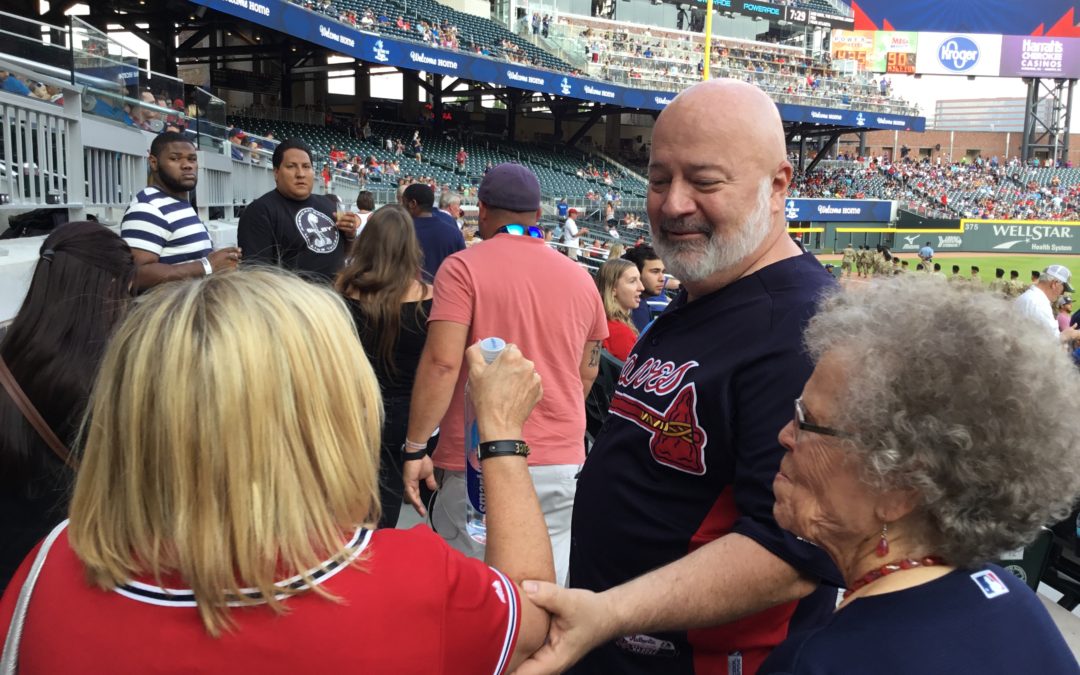
Singing the Anthem at a Professional Baseball Game

Ray Waters
CEO Big Life, Inc.
A few weeks ago, I stood on the field at Suntrust Park, the new home of the Atlanta Braves and sang the Star Spangled Banner. It was stressful and exhilarating. I thought you might enjoy the backstory.
I sing with my two sons and my daughter-in-law Rachel. We are called The Waters Singers. I know it’s not terribly imaginative, but it’s what it is. We sing anytime we are together. We have performed at churches, state fairs and even an Opry House about an hour outside of Atlanta.
We sang the Star Spangled a few years ago at Turner Field, the former home of the Atlanta, Braves. It was a bucket list thing for me. I called my sons and daughter in law, and they all said sure, let’s do it. There is an audition process, and on the other side of that, there is singing at the actual game. We nailed it. It was a good experience.
Fast forward three years. Now, the Braves are in their first season in their new facility called Suntrust Park. They contacted us and wanted to know if we wanted to sing the Anthem at a game again, and we said absolutely.
We arrived at the stadium three hours early for our sound check. We walked down on the beautifully manicured field, took our microphones, and sang. The echo was brutal, and our harmony and tempo were horrible. We could not hear each other at all. It sounded like a jumbled mess to me. Panic set in. But the audio engineer said it was okay.
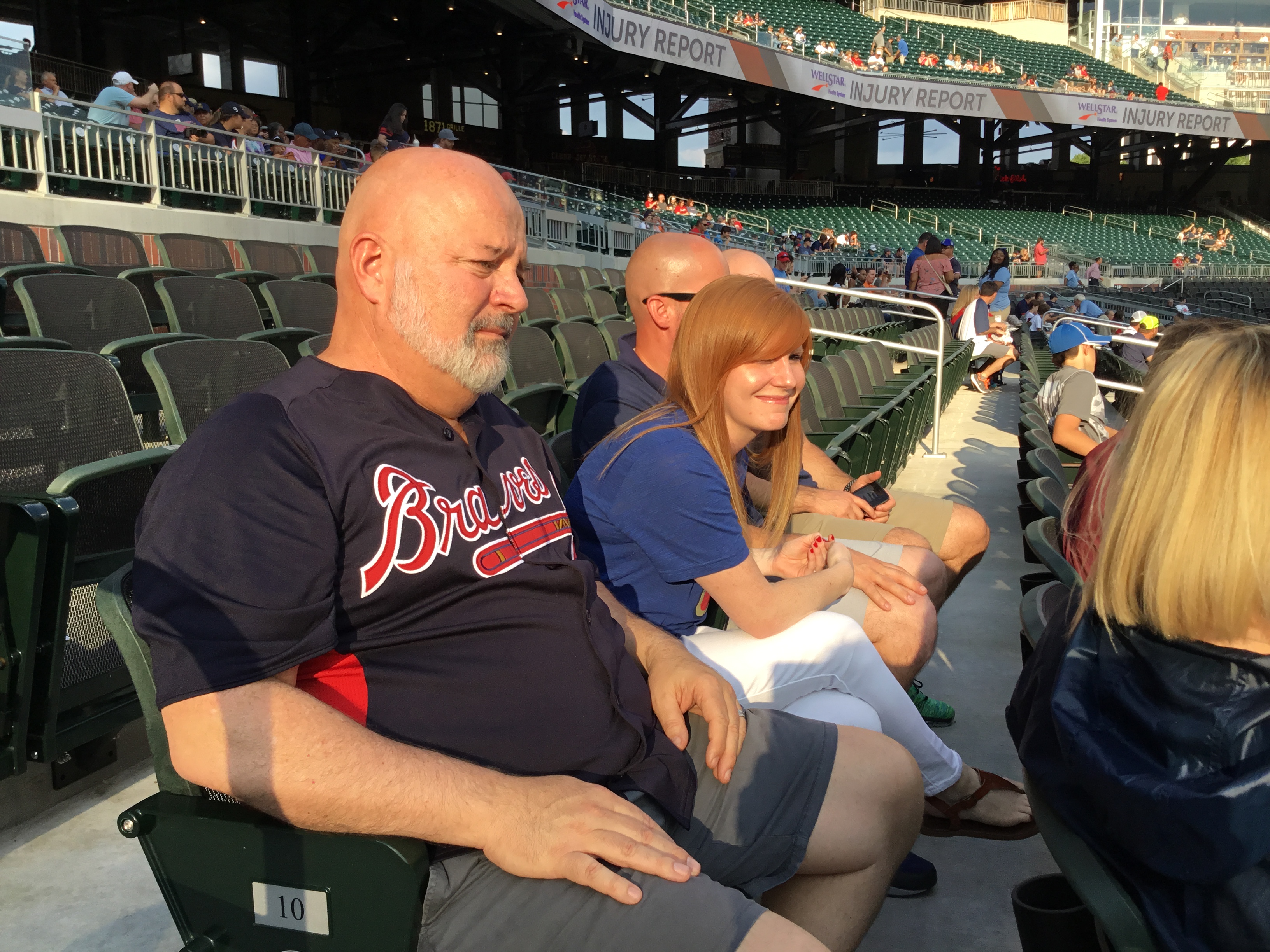
The other singers, all in their 30’s seemed relaxed during the three hours we had to wait before we sang again. I am 55 and a slight perfectionist. I was not relaxed. I was anxious and worried. I don’t like humiliating myself in front of people. Why did I agree to do this?
At 7:15 we walked out on the field at Suntrust Park. For this performance, we had decided we would watch each other’s lips, and we would not let the echo cause us to drag. It would be 1 minute and 30 seconds either way. Sink or swim, let’s do this thing. The voice over the loudspeaker said, “Now, would you kindly remove your hats as you stand to your feet as we honor America with the singing of our National Anthem led by The Waters Singers from Atlanta, GA.
“This is it. Watch your sons, and Rachel and don’t drag,” I thought. “Oh say can you see…..” When we finished, there was a thunderous applause, and as we walked up the stairs into the stands, people were hugging us and saying, “That was beautiful!” Even our very knowledgeable musical friends told us, ‘Great job.” Were they just being nice? Maybe, it had come together. Maybe it wasn’t as bad as I had feared. Maybe it was a miracle.
I have listened to the recording a dozen times, and it wasn’t discordant the way I had imagined it might be. It was not our best work, but it wasn’t bad. In fact, it was pretty good. Overcoming obstacles, we sang in the new stadium before hundreds of friends and tens of thousands of Braves fans. No one there knew the pressure we were feeling to listen to each other and harmonize with some pretty extreme hearing limitations. But we did it. And I am sure glad we did. Now please forgive me if I want to just sing in the privacy of my den for a little while. That was a lot of pressure on this 55-year-old.
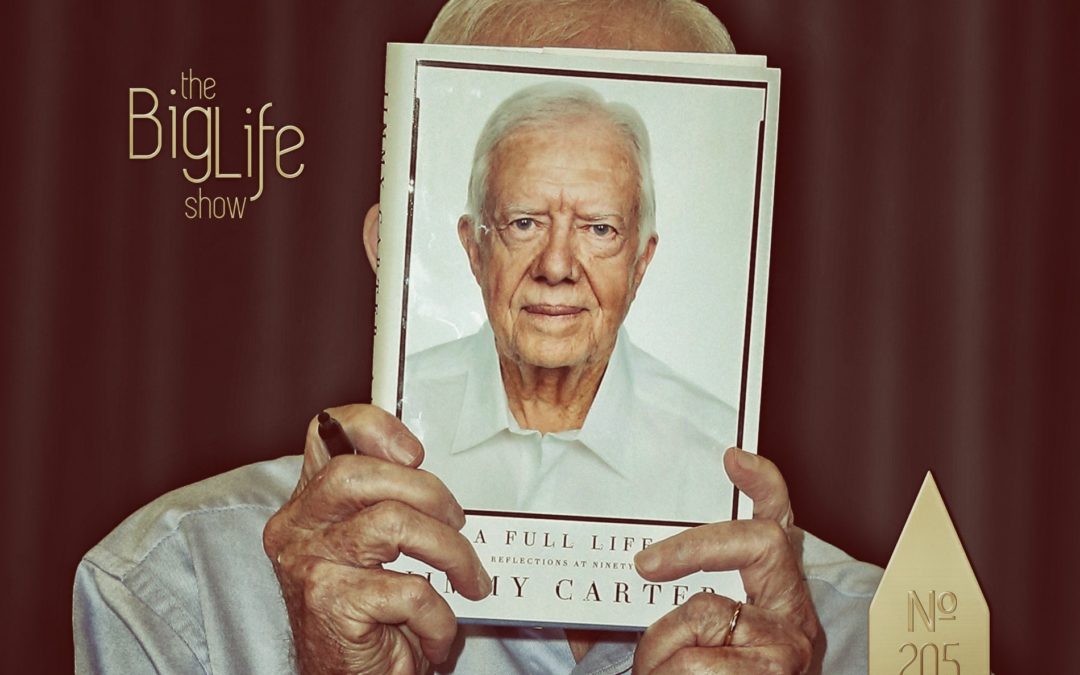
Big Life № 2.05 | Overcoming Conflict & Meeting Jimmy Carter
Big Life № 2.05 | Overcoming Conflict & Meeting Jimmy Carter
Some people seem to live for conflict, but relatively normal, emotionally healthy people don’t enjoy it. That notwithstanding, we all have to deal with conflict from time to time in life.
The first step in moving through conflict to get to the other side is that one side has to make a decision to make the first move. It doesn’t matter if it’s your fault. If you want to get through it, decide to make the move first.
It’s important to be prepared. We talk about Gene Griessman on the show a lot because he’s a wise influence in our lives. Dr. Griessman recommends writing out what he’s going to say before the phone call or meeting because that helps us think through our words and our perspective on a more engaged level. If we casually approach the situation, it is easy to make a situation worse.
Even if the conflict isn’t of your own making, one key element of reaching resolution is for you to be willing to own your portion of the conflict. Take responsibility for any actions or words that escalated the conflict instead of moving it toward resolution.
If you make the conversation about how the other person or people have wronged you, you may have a cathartic conversation, but ultimately that strategy will make it worse before it has a chance to get better.
The most important ingredient in conflict resolution is so obvious, but often it’s the hardest thing to do. We have to listen carefully and with empathy to the other person’s side. When they feel heard and understood, rigid positions begin to soften.
Rather than putting up a fence, let’s talk to the people on the other side. When we do, everything starts to get better.
Truth matters a lot, but it matters far less than kindness. On the other side of resolution, who was to blame matters least of all.
A few weeks ago, we had a #BigLifeBucketList Experience. We got up at four in the morning to drive two hours before daylight to get in line to see President Jimmy Carter teach Sunday School. It was a fun, beautiful experience that Ray wrote about on the Big Life blog.
We both were conservatives in our younger years, but with life experiences, we’ve both grown far more liberal, which is kind of a key factor in how we connected and started working together.
After attending Jimmy Carter’s Sunday School Class, we decided we wanted to read one of his books, and the one we picked is, A Full Life: Reflections at 90.
It’s kind of weird and woo-woo how things just seem to be in the air. At the same time we read the book, Bill Gates read it too, and he wrote a review on his blog.
I would never have guessed I’d get a lesson about the power of intention from Jimmy Carter, but it’s right there in the introduction of A Full Life:
“I saw the presidency as a way to accomplish specific goals that I considered important, decided four years in advance to be elected, and my entire family joined in the all-out campaign.”
I was aware of the highlights of Jimmy Carter’s life, but I didn’t know how the pieces of his background as a peanut farmer, a nuclear engineer, and former governor fit together.
When he was five-years-old Jimmy picked peanuts, boiled them, bagged them up and made more money selling them than grown men made working in the fields all day long.
After high school, he attended the Naval Academy and joined the Navy where he worked as a nuclear engineer who was an influential part of designing the energy sources that powered the first nuclear submarines.
After his father died, much to the disappointment of Rosalynn, he decided to leave the Navy and return home to Pains, Georgia to run his family’s peanut farm.
In his early marriage, he was a typical man of is era. He didn’t regard his wife as an equal partner his decision making. He made the decision to leave the Navy and to run for state Senate without ever talking to Rosalynn.
His heart began to change when running for Senate when Roselyn volunteered to run the farm business and he recognized she was really good at it.
Later in life, Carter renounced his association with the Southern Baptists because of his beliefs in feminism and equal rights.
I was shocked to discover Jimmy Carter is a gadget geek!
He studied electronics throughout his whole life, and because of his job in the Navy and later his roles in government, he’s always had access to know about cutting edge technology before most people knew anything about devices that would eventually become common in popular culture.
He’s also a painter and a poet. The book includes a number of his poems and images of his paintings. He learned to paint during his time at the Naval Academy after a fellow student ordered a painting kit and left school before it was delivered.
One of the reasons we’ve learned from life is how you can have an almost entirely artificial impression of a politician if you experience them primarily through media filters rather than through what they actually do and say. One of my biggest regrets is that I lived a large portion of my life with a false sense of who Jimmy Carter is. The more I experience him without political filters, the more I respect him and want to be more like him.
Now when I look back on his presidency, I think about it the way he does. He writes, “I look back on those four years with peace and satisfaction, knowing that I did my best and had some notable accomplishments. Vice President Mondale summarized our administration by saying, ‘We told the truth, we obeyed the law, we kept the peace.’ I would add, ‘We championed human rights.'”
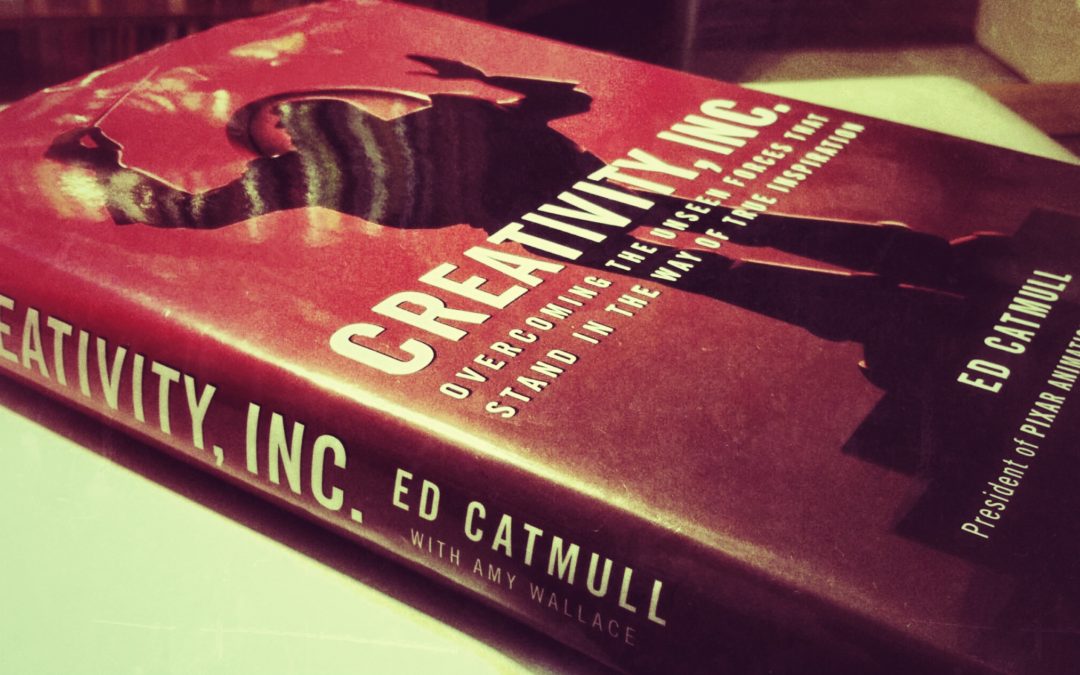
Big Life № 2.04 | Creativity, Inc.
Big Life № 2.04 | Creativity, Inc.
We know that artists are creative. That’s obvious.
Artists take enormous risks to try new things because only originality has value in the art world.
People who aren’t risk takers are frequently reluctant to identify with artists, but you don’t have to be an artist to discover the unique creative nature that is fundamentally a part of who you are.
Every person has within them the capacity to be creative.
Planning a meal requires creativity. Writing an original Facebook post requires creativity. Solving a math or science problem requires creativity. Calming an upset toddler requires creativity.
As we learn and grow, we constantly create new ways of interacting and relating to other people in our lives.
On this episode of Big Life, we talk about creativity and the book Creativity, Inc. by Ed Catmull, the founder and CEO of Pixar.
Having an appreciation for animation isn’t a prerequisite for learning from this book. The book tells the history of Pixar, but more importantly, it shares lessons learned as the Pixar creative team failed again and again behind-the-scenes on the way to one public success after another.
One of our favorite lessons from the book is how important it is to stop anything that isn’t working and immediately move on to a strategy that does work. Too often we get stuck in life trying to make something work that is NEVER going to work.
That can be a relationship, a product idea, a story, a business, or even a religious belief.
By evaluating what works and what doesn’t and only giving time to what works, we start to make legitimate progress and move from failure toward success.

Grateful For Mom
This Sunday is Mother’s Day when we honor our mom’s for loving us the way they do. I know not everyone had a great mom and that makes me sad. Life is not fair. I have been very fortunate, and my mom’s love and devotion have been an undeniable constant since June 9th, 1962 when I took my first breaths.
Brenda Wood grew up in Rockmart GA, a rural community, an hour west of Atlanta. She was the baby of five siblings born to Fred and Thelma Wood. After her dad had died when she was 14, her mom moved the family to the capital city to survive.
Mom met my dad in High School, and they married in June of 1961 when Dad was 18 and mom 16 years old. Twelve months later, I entered the world with my sister Tammy following in 1964. Because of my dad’s job we moved several times. Upstate New York (3 times), Saint Paul, Minnesota and Johannesburg, South Africa all were places where we relocated. And somehow while dad worked, mom made it all work for Tammy and me. Our lives were normal, healthy and fun.
Because dad traveled a great deal with his job, mom made sure we were at every practice and game from Little League through High School. After mom had got off of work, she took me to Cub Scouts. She sat through Band and Chorus Concerts that couldn’t have all been very enjoyable. She watched me act in drama competitions and sing in the Southern Gospel Quartets I would assemble. She also sat through teacher conferences that were sometimes good and occasionally, not so good. She also was doing the same thing for Tammy.
As I grew older and began to date, I would come home from a night out with my girlfriend and want to fill my mom in on where we went and what we did. She was in many ways my best friend. And today we can still get on the phone or sit around a table and talk for an hour or two about just about everything.
Mom and dad divorced when I was 14. Tammy and I were sad but understood things like this happen. To my parent’s credit, they never spoke ill of each other to my sister or me. I will forever be grateful that they did not fight by putting us in the middle. Both of our parents moved on and married partners much better suited for them, and they still are living active, beautiful lives.
On Mother’s Day, I am grateful for a mom who knew how to be tough when it was necessary but who also knew how to throw a ball with me and cook great meals for me and be there for me in every way while I was growing up. She also has never stopped being there for me as an adult.
The country girl from Rockmart is now a mature and still beautiful 73-year-old. She sings in her church choir. She helps prepare food for the needy. She loves her kids, grandkids, and great-grandkids. Her influence in Tammy and my life is immeasurable. Happy Mother’s Day, mom! We are unbelievably grateful to have a mom like you.

Lessons From The Road
A few weeks ago we were in California to babysit grandchildren. While we were there, I was able to drive two vehicles that were different than any I had ever driven. My oldest son had recently bought a BMW electric car and when we arrived, he gave me the key. I drove it everyday for a week. It was a wonderful experience and I became a fan. It took me a day to get used to the fact that the car was totally silent. At first, I was unsure it was even running. There was no noise because it has no muffler. There was no shifting of gears when I increased my speed. The car simply went faster. Braking was very different than a gas powered car. With an electric car, when you take your foot off of the accelerator, the car slows down immediately. So I rarely pressed the brake pedal. I discovered it had ample power, it went from 0-80 mph fast. It was easy to charge up at night and it was wonderful to not have to pay the high cost of gasoline.
The second vehicle I drove was my daughter-in-law’s mini van. It was the latest and greatest with a rear reverse camera and a right blind spot camera that came on whenever you put on the right blinker. I found the cameras helpful, but there was another feature that really impressed me. My first morning drive in the van was taking the grandkids to school. Driving down the road a bell started ringing. I wasn’t sure what was going on. I looked at all the gauges, and the kids from the back seats said, “Big, you are getting out of your lane.” It took me a second before I realized what they were saying. My daughter-in-law’s vehicle had a warning bell telling me I was drifting. I had seen commercials describing this feature, but this was my first time experiencing it. It was quite remarkable. The purpose of this bell was to awaken a sleepy driver or remind a driver like me who often drifts a little to pay attention and stay in my lane.
I have thought a lot about both of those cars. We loved the electric BMW. I wondered if I were in the market for a car would I consider buying one. I also thought a lot about the ringing bell in the van that let me know I was drifting out of my lane. Wouldn’t life be better if we had a little bell in our heads that went off whenever our lives started drifting? How many times have I taken my eyes off of the good road I was traveling? Whether caused by fatigue or distractions, I have drifted off course and found myself in the ditch, looking at the damage I have caused to others and myself.
I am convinced that if we want it, living a big life is possible for all of us. But, it means we have to learn to do some things a little differently than we have done before. We must learn how to open our hearts to more love, more adventure, more gratitude and a whole lot less fear. And, big living also includes learning to recognize when we are beginning to drift. Finding yourself in a ditch does not have to be fatal, but learning to hear the beep in your head and heart to stay focussed on your path can really save you a lot of hurt and heartache on your journey.

It Takes Skills To Be The Captain
Several years ago I traveled to Saint Lucia to meet up with some friends who were spending the summer sailing around the Caribbean. For five days I enjoyed being a part of my first sailing expedition. Our captain was my friend Tony, a C-suite leader of an international corporation. Tony had been sailing for 30 years. The other friends on board had sailed for several years and all knew their roles on the boat. I was the low man on the totem pole, so my job was to get people drinks and do minor clean ups. During the daytime I watched the horizon, drank wonderful beverages, and enjoyed reading a few good books. We would sail all day and drop anchor each evening. We would then take a little dinghy onto shore for fabulous seafood. It was magical and I decided I wanted to learn how to be a captain.
Recently Jane and I, in Cabo San Lucas, Mexico, decided to take a little sail boat out on the Sea of Cortez. I was so excited. Our schedule only allowed us a couple of hours of sailing, but that was all I would need. I had merely been a passenger on my friend’s boat, but I would now be the captain of my own sailing vessel.
About five minutes into our voyage, I discovered it is impossible to learn to sail in a couple of hours. We took our tiny two person sail boat out on the sea and tried to adjust the sails for the direction we wanted to go. Nothing was working. The wind kept getting in my way. The sail wouldn’t go where I needed it to. It was stressful, physically taxing, and not a lot of fun. Trying to keep the sail from spinning around on the boom and knocking us out of the boat was nerve racking. I fought with the process for two hours before finally dropping the anchor and heading to the cantina.
I learned a few things that day.
- Being a good captain looks easy, but it really requires great knowledge and skill.
- Being a good passenger does not qualify you to be a good captain. Learning and practicing the skills of a captain are necessary.
- Learning to sail means knowing which way you want to go and then with intentional focussed action, adjusting the sails to take you there.
Wanting to be the captain is a noble dream. Just don’t forget, it takes training, focus and skill for you to have success in sailing the seas of your Big Life!

Don’t Give Up! Keep Moving Towards Your Destiny
Joanne was struggling. She seemed lost in her own life. She was a good person. She was smart. She didn’t mind working. Why had things come so unravelled? Losing her job, her mother’s death, becoming a mother herself, and then the breaking up of her marriage had left her crushed and confused. With a dependent child, she had to go on government assistance. She was diagnosed as clinical depressed and had seriously contemplated suicide. By her own admission, other than not being homeless, she was as poor as anyone could be.
Was the dye cast? Was she destined to be a failure in life. Would things get better? Could things get better?
Joanne wanted to be a writer. Once on a four-hour-delayed train trip from Manchester to London she had come up with an idea for a story of a young boy attending a school of wizardry. In 1995 she finished that manuscript on an old manual typewriter and submitted her work to 12 publishing houses who all rejected it. She was told she had no real chance of ever making a living as an author. Then the tide began to turn. Her book was published and then was followed by six sequels. Her books have sold over 400 million copies. They have become the best selling book series of all time. Her books have been turned into eight major motion pictures. Joanne is now the most prolific living writer in all of Great Britain. Her fortune is estimated at over $600 million dollars. She is now adored the world over.
Past failures have little to do with future victory. Joanne (J.K.) Rowling has lived a rags to riches story. What made the difference? One thing I am certain of is this. When things were going bad for Joanne she never gave up and settled for what appeared to be her small disappointing life. Failure doesn’t have to be final. And it wont be as long as you decide you have a greater destiny you are determined to fulfill.






